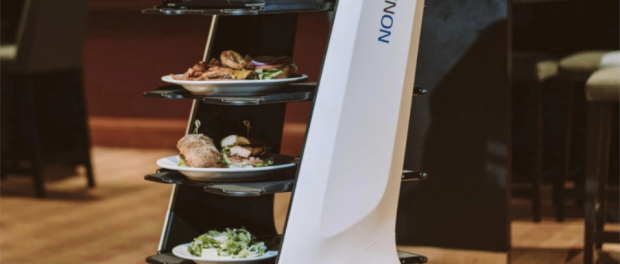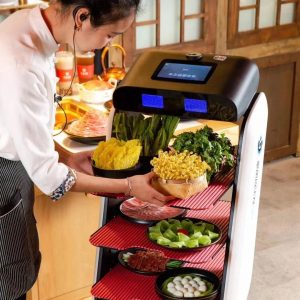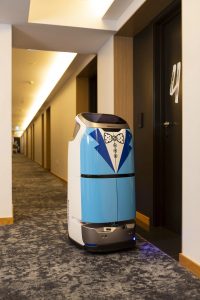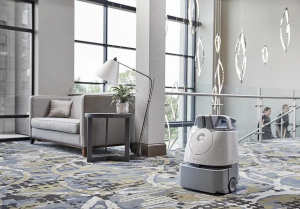Could Cobots be the Saviour of Summer Trading?

With the busiest season of the year just getting underway, and a persistent shortage of staff, hotels are unsurprisingly questioning how they’re going to cope: simply how do hotels keep their businesses afloat with growing demand from customers but a skeleton workforce?
One major part of the solution could lie in embracing new technology of the robotic kind.
Summer is just around the corner, and that means busy times ahead for the UK’s hospitality sector.
Hotels are expected to be particularly busy in the coming months, with three-quarters of Brits planning at least one UK break this year, according to a recent poll.
The research, involving 2,000 UK adults who were surveyed during February and March, found that staycations could be worth £28bn to the economy in 2023, up from £15.5bn last year.
An estimated 40 million Britons are planning at least one UK holiday, with some intending to take a staycation three times this year.
But while this should be heartwarming news for hoteliers, the ongoing staff shortages plaguing the hospitality sector are a huge cause for concern.
Trade body UKHospitality has warned that businesses face a “summer slump” after the latest data from the Office for National Statistics (ONS) confirmed the vacancy rate for the sector remains at around 140,000, as it has for five months.
UKHospitality chief executive Kate Nicholls said: “Hospitality businesses are now entering the busy summer season but what should be a time of optimism has become one of despair. Staff shortages have plagued the sector for years and the labour market now appears to have stagnated at the worst time for hospitality, with vacancies 48% higher than pre-pandemic levels.
“There is no doubt that the sector will be going into the summer understaffed, with significant knock-on impacts for consumers.”
 The combined legacy of the pandemic and Brexit has certainly left many industries struggling to recruit: 60% of Britain’s businesses are trying to fill vacancies according to the latest survey from the British Chambers of Commerce.
The combined legacy of the pandemic and Brexit has certainly left many industries struggling to recruit: 60% of Britain’s businesses are trying to fill vacancies according to the latest survey from the British Chambers of Commerce.
Businesses in hospitality and manufacturing are struggling the most, with 83% of respondents in those industries reporting hiring troubles, while for hospitality companies the greatest difficulties being experienced are in recruiting unskilled workers.
For hotels – requiring housekeeping, reception, concierge and maintenance staff on top of F&B – the struggle to find enough workers to fill their roles is arguably even harder than for pubs and restaurants.
The shortage of housekeeping staff in particular has meant that even some five-star hotels are leaving rooms dirty from Sunday to Thursday because they simply don’t have enough people to clean them.
And this is despite some hotels now offering annual salaries of up to £28,000 for cleaners in a bid to lure more workers to take up jobs.
Against this backdrop and with no sign of the picture improving anytime soon, the prospect of robots becoming a hotel’s newest recruits might start to gain appeal.
In a hotel setting robots – or “cobots” as they’ve been dubbed due to their collaborative work alongside humans – can perform a range of manual, time-consuming tasks, from vacuuming floors to delivering room service trays and carrying dishes to tables.
As the name “cobot” suggests, their purpose is not to replace humans but to make life easier for staff and to free team members up so they can give better customer service.
And as for how staff might take to the idea of working alongside robots, a survey of hospitality employees carried out last year by CGA may give some indication: three in ten workers said the technology available to staff was not at all advanced, while 88% wanted to see technology in the hospitality sector improve.
What’s more, embracing new technology like cobots could make all the difference when it comes to attracting tech-loving Gen Z jobseekers to join the hospitality workforce.
Leading cobot supplier to the hospitality industry, Softbank Robotics, says its customers are reporting higher levels of staff satisfaction because the robots take care of “the more tedious tasks”.
Softbank Robotics general manager Stefano Bensi said: “With a cobot on hand, menial and time-consuming tasks are taken care of autonomously. Staff have more time to concentrate on higher-value, more intricate jobs like touchpoint cleaning (in the case of a robotic vacuum cleaner) or spending more time with customers (in the case of tray delivery robots).
“We know that in the hospitality industry it is a real struggle to recruit and retain staff, and this means that robots can help add additional support to existing teams, plug labour gaps and shortages, and work when necessary to improve processes.”
Softbank’s cleaning robot Whiz can memorise up to 600 cleaning routes, vacuum 1,500 sq m of carpet on a single charge, and provide reports on its performance.
It is equipped with a 3D camera and a lidar (light detection and ranging) system.
“These are typically the types of components used in self-drive cars,” explained Bensi.
“Its compact size is extremely convenient because it can clean in narrow corridors, and it is very easy and intuitive to use which means cleaners can quickly pick up how it operates.”
It can also be programmed to clean at any time of day, and it’s much more efficient than manual vacuuming, according to Bensi.
“When people vacuum manually they tend to go backwards and forwards over the same spot which means each metre is vacuumed around 1.7 times. The Whiz will only do it once,” he added
Softbank’s tray delivery robots use similar technology and come into their own in a situation where staff have to carry heavy trays of dishes a long distance from the kitchen, and where communication between front- and back-of-house is difficult. For hotels offering room service, Softbank’s W3 robots can be programmed to integrate with the lifts and will call the guest to alert them once their order is outside their door.
For hotels offering room service, Softbank’s W3 robots can be programmed to integrate with the lifts and will call the guest to alert them once their order is outside their door.
It’s true to say that many hotels adopted technological aids to help them through the pandemic, with hoteliers forced to adopt automated methods to keep guests and staff safe.
Could it be that the time has come for hotel operators to recognise that technology isn’t limited to helping with bookings, ordering and payments? Perhaps it could also provide hotels with new team members – and quite possibly help them stand out from the competition too.
About Softbank Robotics Group Corp.
SoftBank Robotics is driving technology forward by becoming a worldwide leader in robotics solutions. The company is rapidly expanding, with offices in Tokyo, San Francisco, Boston, London, Paris, Hamburg, Amsterdam, Copenhagen, Singapore, Sydney, Shanghai, and Hong Kong.
SoftBank Robotics is constantly exploring and commercializing robotics solutions that help make people’s lives easier, safer, more connected, and more extraordinary. SoftBank Robotics’ robots are used in more than 70 countries worldwide, offering innovative solutions relevant in the fields of tourism, retail, healthcare, finance, education, facilities management, cleaning, warehouse, and logistics.


